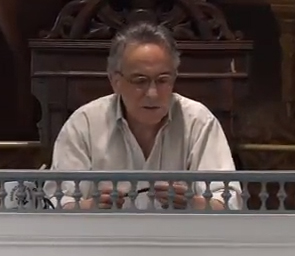That suggestion led to the resignation of four members of the HDC board and its legal counsel. DePietro's disdainful attitude toward HDC revealed itself again at last night's meeting of the Conservation Advisory Council (CAC).
On the meeting's agenda was an update on plans for an autumn Arbor Day. It will be remembered that last year the CAC declared October 16 Arbor Day in Hudson and celebrated by planting five new street trees in the city, one in each ward. Last night, CAC member Britt Zuckerman reported that she had applied for a $10,000 grant from National Grid to fund this year's Arbor Day but said the application was still under review and indicated she thought receiving the grant was a "long shot." She told her colleagues that, without the grant, there could be no Arbor Day and went on to say, if they were to hold the event within the fall planting window (September 15 through October 31), planning for the event should already be underway.
The Hudson Development Corporation is a private nonprofit established in 1976 as a Local Development Corporation for the purposes of sustaining, promoting, and enabling business investment and employment opportunities, as well as strengthening the City of Hudson's tax base to help secure its future as a desirable place to live, work, and invest.
A simple definition of tax base is this: "The tax base is the total amount of income, property, assets, consumption, transactions, or other economic activity subject to taxation by a tax authority." Given that, aside from the lodging tax, the only thing subject to taxation by the City of Hudson is real property, strengthening the tax base would seem logically to mean increasing the amount of property in Hudson that is fully taxable, increasing the value of existing property that is now underused and hence undervalued (e.g., vacant lots and vacant structures), and being careful about how much property is developed that is tax exempt or subject to long-term tax abatements. Of these three things, HDC can have some impact on the first two by "sustaining, promoting, and enabling business investment" but little on the third. This statement, from the same source as the definition of tax base, provides a reason why increasing the tax base would be a good thing: "A broad tax base . . . allows more revenue to be raised at lower rates." In other words, a broader tax base would increase the city's revenue from taxes without increasing taxes for individual property owners.
COPYRIGHT 2022 CAROLE OSTERINK



While I am a member of the HDC board of directors, I make the following observation as a private citizen: Tom DePietro epitomizes the Peter Principal when it comes to civic leadership -- he has risen to his own level of incompetence. He exhibits a tendency towards magical thinking and a disdain for ideas and the comprehension of limiting governmental overreach. He is, in a word, an ass.
ReplyDeleteNow, as a member of the HDC board I say on my behalf, and believe that I can say on behalf of many of my colleagues, that Tom's absence from meetings has been and will remain welcome.
there are a lot of puzzling and troubling aspects of Tom's "leadership." What strikes me most is at meetings when he will try to answer questions that I ask of department heads before they have a chance to respond. This "president" title has certainly gone to his head. I once asked a question of Ed Moore at a cc meeting and he literally had to interrupt Tom, who began attempting to answer the question himself, "I can answer Mr. Huston's question," and proceeded to do so. Tom thinks that he is the guy in control, and not just of the meetings. It's bizarre and troubling. I remember a time when you hardly heard a peep out of prior cc "presidents."
ReplyDeleteI should think that 'increasing the tax base' would be helped if the IDA agreed and stopped giving out PILOTS.
ReplyDelete